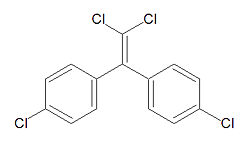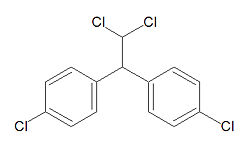DDT: Difference between revisions
Jump to navigation
Jump to search

imported>David E. Volk (structure picture and IUPAC name added) |
imported>David E. Volk (structures and names of DDE and DDD (breakdown products)) |
||
| Line 1: | Line 1: | ||
{{subpages}} | {{subpages}} | ||
[[Image:DDT DEVolk.jpg|right|thumb| | [[Image:DDT DEVolk.jpg|right|thumb|250px|{{#ifexist:Template:DDT DEVolk.jpg/credit|{{DDT DEVolk.jpg/credit}}<br/>|}}Structure of DDT.]] | ||
'''DDT''', abbreviated from '''Dichloro-diphenyl-trichloroethane''', but correctly called by its IUPAC name '''1,1,1-trichloro-2,2-bis(4-chlorophenyl)ethane''' is an organochlorine pesticide that is very effective at killing [[mosquitoes]] and was used effectively in the fight against [[malaria]].<ref>http://www.aaenvironment.com/DDT.htm</ref> | '''DDT''', abbreviated from '''Dichloro-diphenyl-trichloroethane''', but correctly called by its IUPAC name '''1,1,1-trichloro-2,2-bis(4-chlorophenyl)ethane''' is an organochlorine pesticide that is very effective at killing [[mosquitoes]] and was used effectively in the fight against [[malaria]].<ref>http://www.aaenvironment.com/DDT.htm</ref> | ||
The campaign against DDT was started by [[Rachel Carson]] with her book [[Silent Spring]]. While DDT itself is safe, DDT breaks down into [[DDE]] and [[DDD]].<ref>http://www.eco-usa.net/toxics/ddt.shtml</ref> DDE has been classified as a possible carcinogen by the EPA.<ref>http://www.epa.gov/ttn/atw/hlthef/dde.html</ref> | The campaign against DDT was started by [[Rachel Carson]] with her book [[Silent Spring]]. While DDT itself is safe, DDT breaks down into [[DDE]](dichlorodiphenyldichloroethylene) and [[DDD]](dichlorodiphenyldichloroethane).<ref>http://www.eco-usa.net/toxics/ddt.shtml</ref> DDE has been classified as a possible carcinogen by the EPA.<ref>http://www.epa.gov/ttn/atw/hlthef/dde.html</ref> | ||
DDT was banned in 1972 by the Environmental Protection Agency under Administrator William Ruckelshaus, but it is still used in some countries.<ref>http://www.aaenvironment.com/DDT.htm</ref> | DDT was banned in 1972 by the Environmental Protection Agency under Administrator William Ruckelshaus, but it is still used in some countries.<ref>http://www.aaenvironment.com/DDT.htm</ref> | ||
[[Image:DDE DEVolk.jpg|right|thumb|250px|{{#ifexist:Template:DDE DEVolk.jpg/credit|{{DDE DEVolk.jpg/credit}}<br/>|}}Structure of DDE.]] | |||
[[Image:DDD DEVolk.jpg|right|thumb|250px|{{#ifexist:Template:DDD DEVolk.jpg/credit|{{DDD DEVolk.jpg/credit}}<br/>|}}Structure of DDD.]] | |||
Revision as of 11:04, 17 January 2008
DDT, abbreviated from Dichloro-diphenyl-trichloroethane, but correctly called by its IUPAC name 1,1,1-trichloro-2,2-bis(4-chlorophenyl)ethane is an organochlorine pesticide that is very effective at killing mosquitoes and was used effectively in the fight against malaria.[1]
The campaign against DDT was started by Rachel Carson with her book Silent Spring. While DDT itself is safe, DDT breaks down into DDE(dichlorodiphenyldichloroethylene) and DDD(dichlorodiphenyldichloroethane).[2] DDE has been classified as a possible carcinogen by the EPA.[3]
DDT was banned in 1972 by the Environmental Protection Agency under Administrator William Ruckelshaus, but it is still used in some countries.[4]


